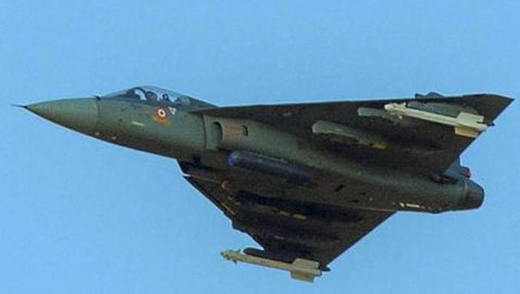IAF inducts 1st Tejas squadron: 10 things to know about the warplane
Mangalore Today News Network
New Delhi, Jul 01, 2016: More than three decades after it was conceived, the light combat aircraft (LCA) Tejas formed its first squadron for the Indian Air Force (IAF) on Friday with two jets.

The much delayed home-grown project was approved in 1983 as a replacement for the IAF’s ageing MiG fighters. The first craft was handed over to the air force in January 2015 by defence minister Manohar Parrikar.
The Tejas variant inducted into the IAF at a ceremony in Bengaluru is in its initial operational clearance (IOC) configuration and comes with limited capabilities. Subsequent versions are expected to pack a powerful punch for the air force.
Multi-religious prayer ceremonies were held at the induction ceremony.
Here’s a quick take on the aircraft:
1) The LCA was conceived as a project in 1982, but sanctioned only nine years later. The project suffered due to sanctions imposed by the United States after India conducted nuclear tests in May 1998.
2) The aircraft’s indigenous content is around 65%. The per-unit cost of the warplane is expected to be upwards of Rs 150 crore.
3) The variants to follow will be in the final operational clearance (FOC) configuration, and another modified model called Tejas Mk-1A will be introduced.
4) The newer variants will have additional long-range weapons, superior radar, advanced electronic warfare suite and mid-air refuelling capability.
5) The first squadron is being raised with two fighters at Sulur in Tamil Nadu, with another six to eight warplanes likely to be inducted next year, enabling it to be deployed at a forward airbase in accordance with the IAF’s war plans. The IAF plans to induct 120 Tejas crafts over the next decade.
6) The single-engine planes are being manufactured by Bengaluru-based Hindustan Aeronautics Limited.
7) The count of IAF’s fighter squadrons has shrunk to 33 compared to a desirable strength of 42, a capability gap the air force is struggling to fill. The induction of the LCA will help it counter depleting force levels.
8) In IOC configuration, the warplanes will have air defence and ground attack capabilities. These features include delivering air-to-air missiles and smart weapons.
9) In May 2015, a Comptroller and Auditor General report revealed that Tejas was riddled with 53 “significant shortfalls” that could compromise its survivability in combat.
10) Around18-19 deficiencies relating to maintenance are still to be taken care of. However, all shortcomings relating to flight safety have been addressed.
- Akshata Poojary case: Complaint and counter-complaint against Brahmavar police transferred to CID
- Mangaluru: Bharath Shetty slams Congress government over anti–hate speech Bill, calls it threat to free expression
- Mangaluru celebrates Christmas with prayers, grand festivities
- Moodbidri: Body of man found in Hosanagady river; suicide suspected
- Banks urged to help customers reclaim Rs 140 crore lying in inactive accounts in Dakshina Kannada
- Changes in train services due to South Western Railway works
- MCC forms three teams to crack down on illegal flexes and banners in Mangaluru
- 9th Edition ’Mangaluru Kambala’ on December 27
- Udupi Bishop Dr Gerald Isaac Lobo extends Christmas greetings
- Mangaluru: Eight members of cattle-theft gang arrested by Bajpe police
- Belthangady Navoor murder case: Court acquits wife citing mental illness despite murder conviction
- Three blackbucks found dead with bullet injuries in Chikkamagaluru
- BJP wins majority in Kinnigoli and Bajpe Town Panchayat elections
- PM Modi attends Christmas service at Delhi church, greets citizens
- Minister R Ashoka accuses Congress of cheating 1.26 crore Gruha Lakshmi beneficiaries
- Centre imposes complete ban on new mining leases in Aravalli
- Byrathi Basavaraj moves High Court for anticipatory bail in murder case
- Nine charred to death as truck rams into private bus near Chitradurga
- Rohit Sharma, Virat Kohli smash statement hundreds on Vijay Hazare Trophy return
- Uddhav, Raj announce political alliance ahead of municipal bodies poll
- We’re biggest fugitives: In new video, Lalit Modi, Vijay Mallya taunt India
- SIR 2.0: 3.67 crore voters dropped from draft electoral rolls across 11 states and UTs
- India’s ’Baahubali’ rocket places heaviest-ever satellite in orbit
- Bengaluru techie shoots wife a week after she sends him divorce notice
- Unnao rape case: Delhi High Court suspends jail term of Kuldeep Sengar, grants bail
- Mangaluru Student Goes Missing; Ullal Police Register Case
- APD Foundation Joins WHO Civil Society Commission
- Daiva’s prediction comes true: Janardhan Reddy walks free from jail
- Skills and Competencies Take Center Stage at MSN Dialogue Series
- Court remands Maoist Lakshmi to six-day police custody
- Sandhya Shenoy honored with Society for Materials Chemistry Medal-2024
- White Cornus Apartment in Mangaluru
- City girl wins first place in state-level spell bee competition
- Alleged ‘Love Jihad’ Case in Mangaluru: Woman left home voluntarily, says police
- Girl fatally struck by reckless two-wheeler near Belman
- New residential complex for the judges inaugurated in Mangaluru
- Absconding accused nabbed after 8 years
- Truck with cylinders turns turtle in Beltangady
- Bhoota Kola artist dies of cardiac arrest
- Development of the country should be our goal: Ganesh Karnik
- CITY INFORMATION
- TRAVEL
- TOURIST INFORMATION
- HEALTH CARE
- MISCELLANEOUS




 Write Comment
Write Comment E-Mail To a Friend
E-Mail To a Friend Facebook
Facebook Twitter
Twitter  Print
Print 


